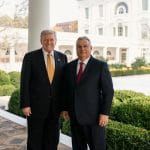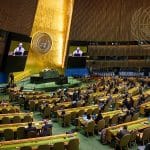U.S. Treasury Under Secretary for International Affairs Nathan Sheets faced a hardball question Wednesday, April 26 while at a hearing at the House of Representatives Financial Services Committee. Within an hour the Greek media started interpreting Sheets’ remarks as interference from the so-called “American factor” in the drawn-out negotiations between Greece and its current “quartet” of creditors for the first review under the 2015 bailout.
Responding to a question from a conservative Member of Congress, about whether another bailout with Greek debt sustainability in question would go forward “even if the Greeks weren’t willing to do what’s necessary to right the ship,” Under Secretary Sheets stressed two points. He said the IMF would be involved in the next phase of the Greek bailout as a lender only if they believed the reform program “is a significant one” and that they were comfortable that the Greek authorities have taken ownership of the program. (This is very different from the current situation where the Syriza government constantly underlines the fact that the creditors imposed the program on Athens).
Under Secretary Sheets comments on debt will generate dozens of articles and pundits’ commentary but there is nothing new in essence beyond the fact that an American official is involved in the commentary. Completing his explanation, Sheets told his congressional interlocutor that the IMF’s participation was contingent on significant debt relief (as usual, undefined) from Greece’s European partners to ensure that debt sustainability is achieved. He stated that the U.S. Treasury Department supported the IMF’s position fully, meaning that a strong structural reform program had to be accompanied by significant debt relief.
The Syriza government in Athens, looking for anything positive to support its somewhat convoluted policy of accepting the IMF’s views on debt but rejecting IMF requirements on reforms, will surely latch onto this, but there is nothing new here other than an American official speaking in an internal U.S. policy discussion.
A transcript of the Q&A on Greece can be found here:
https://www.marketnews.com/content/us-tsys-sheets-tsyimf-together-insist-greece-debt-relief
Greek Debt: What exactly did Treasury's Under Secretary Sheets mean about Greece and the IMF?
- Advertisement -
- Advertisement -






